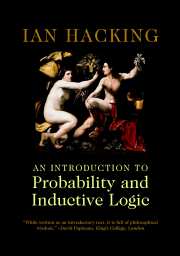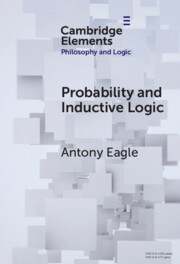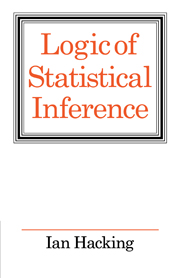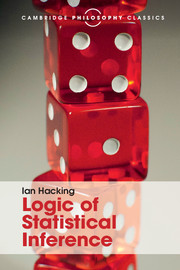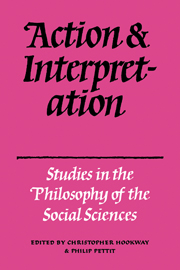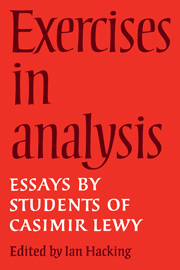An Introduction to Probability and Inductive Logic
This is an introductory 2001 textbook on probability and induction written by one of the world's foremost philosophers of science. The book has been designed to offer maximal accessibility to the widest range of students (not only those majoring in philosophy) and assumes no formal training in elementary symbolic logic. It offers a comprehensive course covering all basic definitions of induction and probability, and considers such topics as decision theory, Bayesianism, frequency ideas, and the philosophical problem of induction. The key features of this book are a lively and vigorous prose style; lucid and systematic organization and presentation of ideas; many practical applications; a rich supply of exercises drawing on examples from such fields as psychology, ecology, economics, bioethics, engineering, and political science; numerous brief historical accounts of how fundamental ideas of probability and induction developed; and a full bibliography of further reading.
- Lively and rigorous style; clear and systematic presentation; assumes no prior knowledge of symbolic logic
- Contains lots of exercises with examples from psychology, bioethics, ecology, economics and political science; shows practical applications
- Hacking internationally known; 5 previous CUP books; Modern Library selected Taming of Chance as one of 100 best books of the twentieth century
Reviews & endorsements
"While written as an introductory text, it is full of philosophical wisdom. Moreover, this is wisdom that most students of philosophy need but find very hard to acquire. Hacking explains all the basic ideas of probability theory, the philosophical puzzles they raise, the standard lines of response, their strengths and weaknesses. He writes with the authority of someone who has helped form the debates and understands everything properly, but at the same time he gives a fair hearing to all positions worth taking seriously. At some point in the career of most philosophy students, graduates and undergraduates alike, they read stuff, which uses probalistic ideas and turn to their teachers for guidance. I can imagine that the teachers' automatic response for some decades to come will be to send these students to Hacking." David Papineau, King's College, London
"Hacking's textbook is likely to become the standard for inductive logic courses. He writes simply, in a lively style, without oversimplification. it starts at the beginning, and throughout uses only the simplest calculations. As it goes on, tools including P-values, confidence intervals, expected values, the basics of decision theory, and Bayesianism are introduced with mathematical honesty and refreshing philosophical scrutiny. Lively and original examples drawn from everyday life create the appropriate context to prepare students to think critically about the barrage of statisical arguments that confront us on a daily basis. From Madison Avenue's "4 out of 5 dentists choose..." to highly sophisticated economic modeling we poll and make prophecies based on statistical information regularly. Hacking's textbook sheds much needed light on the mystique reasoning." Katherine van Uum, Grinnell College, Iowa
Product details
July 2001Paperback
9780521775014
322 pages
251 × 175 × 20 mm
0.57kg
Available
Table of Contents
- Part I. Logic:
- 1. Logic
- 2. What is inductive logic?
- Part II. How to Calculate Probabilities:
- 3. The gambler's fallacy
- 4. Elementary probability
- 5. Conditional probability
- 6. Basic laws of probability
- 7. Bayes' rule
- Part III. How to Combine Probabilities and Utilities:
- 8. Expected value
- 9. Maximizing expected value
- 10. Decision under uncertainty
- Part IV. Kinds of Probability:
- 11. What do you mean?
- 12. Theories about probability
- Part V. Probability as a Measure of Belief:
- 13. Personal probabilities
- 14. Coherence
- 15. Learning from experience
- Part VI. Probability as Frequency:
- 16. Stability
- 17. Normal approximations
- 18. Significance
- 19. Confidence and inductive behaviour
- Part VII. Probability Applied to Philosophy:
- 20. The philosophical problem of induction
- 21. Learning from experience as an evasion of the problem
- 22. Inductive behaviour as an evasion of the problem.

